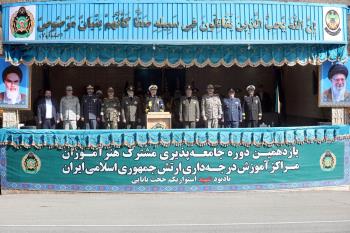Alwaght- The severe heat wave is a big challenge to countries suffering from energy shortage. Lebanon is one of the countries that due to lack of oil and gas faces major challenges producing its power, and since Saturday, the country sank in power blackout due to shortage in fuel fed to the power plants.
Lebanon's electricity company announced that as the power plants run out of fuel, power across the country including in the airports, ports, and prisons went off.
The Lebanese Electricity Company emphasized that the power cut was due to the shutdown of the last active part of the Al-Zahrani power plant.
The company assured the electricity customers that it has taken all possible preventive measures in order to prolong the period of electricity generation under the current special conditions, and after supplying diesel, once again the power plants that were inevitably out of service will resume power generation.
Power outages in Lebanon have been a big challenge for the service sector in addition to the problems created for domestic subscribers.
In this regard, General Director of Aviation of Beirut Airport, Fadi Al-Hassan, in his first comment about this crisis confirmed that the airport is currently supplying electricity from generators and "we hope that the crisis will not last long."
Despite the concerns about power outages, the Minister of Energy of Lebanon, Walid Fayyad, in response to the end of fuel reserves in the power plants and the nationwide interruption of the flow of power in this country, expressed hope that the new shipments of gas from Egypt will arrive in Lebanon by August 23.
"Power generators will temporarily supply electricity to Beirut Airport for 2 days... Lebanese government has taken preventive measures to predict the end of fuel," engery minister said.
In recent years, Lebanon has been suffering from severe power shortage, especially after the financial crisis that the country has experienced since 2019. Lebanese homes and businesses rely on generators that only provide the electricity they need for a few hours.
Two years ago, the frequency of power outages increased significantly in Lebanon as the government suffered from financial problems that resulted in its inability to secure foreign currency for fuel imports. Although power outages are common in some countries in the summer, considering the current situation in Lebanon, it can impose a lot of costs on the country.
Lebanon has managed in recent years to provide its fuel from regional countries as much as possible. In August 2021 that the country suffered from fuel shortage and it run out of gasoline, Iran sent 80 tankers of fuel to help settle the problem.
Active power plants in Lebanon
Lebanon has a number of power plants to supply its electricity needs, which will not have a problem generating electricity if the fuel they need arrives. Energy production in Lebanon used to be between 1,600 and 2,000 megawatts per day, but fuel shortages in recent years have gradually cut production to record low levels.
The country currently has eight thermal power plants, including Zouk, Al-Zahrani, Deir Ammar, Jayeh, Harisheh, Tirreh, Baalbek, and Kesara. Zouk with a production capacity of 608 megawatts is considered the largest power plant in this country and all these power plants work with mazut to supply the required power.
Al-Zahrani in the south is one of the main power plants in Lebanon and was the last to stay active until Saturday as it provided a major portion of the nation's electricity needs.
Since Lebanon does not have oil reserves, it has to meet its needs from other countries. In recent years, the country imported its oil more from Greece ($1.67 billion), Turkey ($1.2 billion), Italy ($531 million), Cyprus ($301 million) and Russia ($200 million). The fastest refined oil import markets for Lebanon between 2021 and 2022 were Turkey ($430 million), Greece ($420 million) and Italy ($354 million).
On the other hand, Lebanon has signed agreements with friendly countries to diversify its oil imports. Meanwhile, in July 2021, Lebanon signed an agreement with Iraq to import one million tons of fuel in order to relieve the fuel shortage in the country, which according to Lebanese officials, is enough to supply Lebanon's electricity needs for four months.
Lebanon also signed an agreement with Egypt and Syria in July 2021 to import gas from these countries, 30 percent cheaper than the price of gas in the world market. Currently, Egypt is the largest supplier of gas to Lebanon, and it is going to send new shipments in a bid to contain the power outage crisis.
In recent years, Lebanon has taken steps to provide electricity from renewable energies though this sector currently plays a marginal role in Lebanon's energy balance.
Currently, the country operates 11 hydroelectric power plants whose output is less than 5 percent of the total necessary power and less than 10 percent of the nation's power production. Hydropower is the only renewable energy source though Lebanon has a large capacity for solar and wind energy.
Lebanon has a joint gas field, named Karish, with the Israeli regime in the Mediterranean, which can solve its energy problems if bilateral agreements are reached. Tel Aviv intends to sieze all the reserves of this gas field, but Hezbollah vowed it will not allow Israelis to do so. Due to the failure of negotiations on the drawing of maritime borders, Lebanon and Israel do not produce gas from this gas field.
US capitalizing on the crisis
Given the energy crisis in Lebanon beside the growing economic crisis, some foreign actors may take advantage of the situation to destabilize the country.
In recent years, due to the economic crisis and power shortage, Lebanon has witnessed protests multiple times, and the US and its regional allies also rode on this wave in order to dictate their policies to this country and to topple Hezbollah-allied governments by sowing instability in the country.
Washington and some Persian Gulf Arab monarchies that seek to sideline Hezbollah from the politics imposed financial sanctions against the Lebanese banking sector in the past years and are always watching for an opportunity to increase the pressure on Hezbollah and turn the people against it.
Therefore, in the current conditions that tensions between Hezbollah and Israel are heightening and an all-out war is not unlikely, the power outage can given the Americans the excuse to put strains on Hezbollah.
In recent years, Washington has gone to great lengths to force-stop Hezbollah attacks on Israel that are conducted in solidarity with Gaza, but it failed to meet its goal. If the power outage lasts long, popular discontentment and protests are open to re-ignition. This is what the US is watching for and by fueling the protests, it can paint Hezbollah as the main party behind the crisis.
At a time tensions with Israel are at their height, Lebanon is not ready for massive protests, and the US can leverage the protests in an attempt to stop Hezbollah operations on the northern Israeli front.



























